2014年人教版新目标七下unit4-6总复习课件
人教版英语七年级下册 Unit 4 ---6考点梳理复习
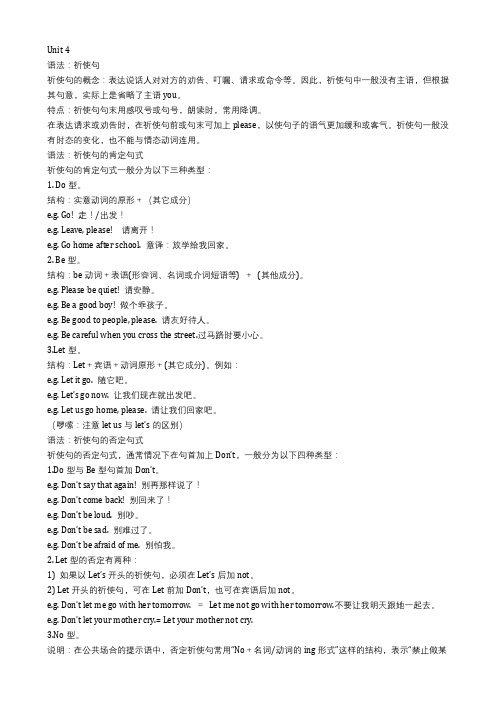
语法:祈使句祈使句的概念:表达说话人对对方的劝告、叮嘱、请求或命令等。
因此,祈使句中一般没有主语,但根据其句意,实际上是省略了主语you。
特点:祈使句句末用感叹号或句号,朗读时,常用降调。
在表达请求或劝告时,在祈使句前或句末可加上please,以使句子的语气更加缓和或客气。
祈使句一般没有时态的变化,也不能与情态动词连用。
语法:祈使句的肯定句式祈使句的肯定句式一般分为以下三种类型:1. Do型。
结构:实意动词的原形+(其它成分)e.g. Go! 走!/出发!e.g. Leave, please! 请离开!e.g. Go home after school. 意译:放学给我回家。
2. Be型。
结构:be动词+表语(形容词、名词或介词短语等) +(其他成分)。
e.g. Please be quiet! 请安静。
e.g. Be a good boy! 做个乖孩子。
e.g. Be good to people, please. 请友好待人。
e.g. Be careful when you cross the street.过马路时要小心。
3.Let型。
结构:Let+宾语+动词原形+(其它成分)。
例如:e.g. Let it go. 随它吧。
e.g. Let’s go now. 让我们现在就出发吧。
e.g. Let us go home, please. 请让我们回家吧。
(啰嗦:注意let us与let’s的区别)语法:祈使句的否定句式祈使句的否定句式,通常情况下在句首加上Don’t,一般分为以下四种类型:1.Do型与Be型句首加Don’t。
e.g. Don’t say that again! 别再那样说了!e.g. Don’t come back! 别回来了!e.g. Don’t be loud. 别吵。
e.g. Don’t be sad. 别难过了。
e.g. Don’t be afraid of me. 别怕我。
中考英语分册复习七下Units4_6课件人教新目标版
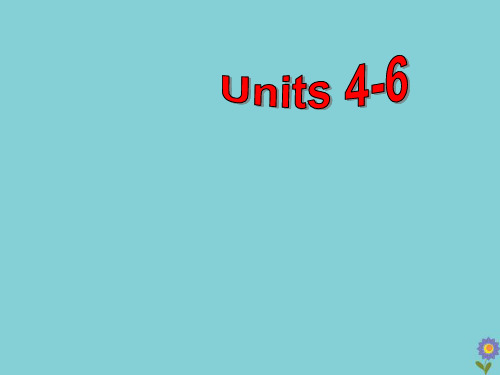
42. ___y_o_u_n_g_____ adj. 幼小的;年轻的 →___o_ld_______ adj. 老的(反义词)
43. ___m__is_s______ v. 怀念;司念;错过 44. ___w_is_h_______ v. 希望
→__h_o_p_e______ v. 希望 (近义词) 45. __d_e_l_ic_i_o_u_s____ adj. 可口的;美味的 46. __s_t_il_l ________ adv. 还;仍然
(二)短语
1. _a_n_y_o_t_h_e_r_n__ig_h_t__ 任何(一个)其他的夜晚 2. _a_r_r_iv_e__la_t_e_f_o_r_c_l_a_ss__ 上课迟到 3. _a_s_y_m__b_o_l_o_f_g_o_o_d__lu_c_k___ 好运的象征 4. _b_e_fo_r_e__d_in__n_e_r___ 晚餐前 5. _b_e_i_n_(_g_r_e_a_t_) _d_a_n_g_e_r 处于(极大)危险之中 6. _b_e_m__a_d_e_o_f__iv_o_r_y___ 由象牙制成 7. _b_e_o_n__ti_m_e__f_o_r_c_la_s_s_ 准时上课
The line is bad / busy. I couldn’t get through. Sorry. I’m afraid you have the wrong number.
(一)单词
1. arrive v. 到达
→__l_u_c_k_y_____ adj. 幸运的 →__l_u_c_k_il_y____ adv. 幸运的 21. ___k_e_ep_________ v. 保持;保留 22. __l_e_a_r_n_______ v. 学习;学会 →__s_tu_d_y______ v. 同义词
人教新目标七年级下Unit4总复习课件(共20张PPT)
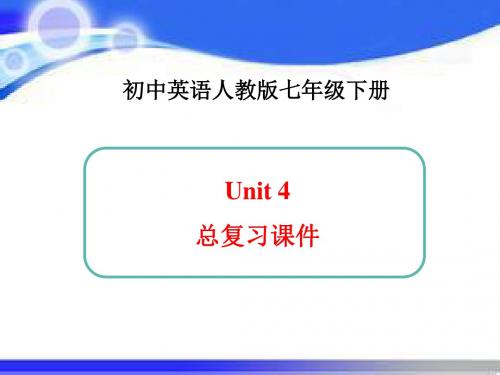
tomorrow. 不要让我明天跟她一起去。
语法加油站
本单元语法知识大回顾—how引导的特殊疑问句
3. 在公共场合的提示语中,常用“No+名词/V-ing形式”结构,
表示禁止做某事。例如:
NO PHOTOS! 禁止拍照! 三、祈使句的反意疑问句 祈使句的反意疑问句通常用will you。例如: Don’t smoke in the meeting room, will you?不要在会议室抽烟,好吗? Let开头的祈使句构成反意疑问句时,除Let’s用shall we外,其它均 用will you。例如: Let the boy go first, will you? 让个那男孩先走,好吗?
“No,…can’t.”
2) bring 动词,意为“带来,取来”。
句型大闯关
本单元重点句子有哪些?看谁说得多!
4. There are too many rules! 有太多的规定! too many “太多的”,中心词是many,修饰可数名词复数。
too much“太多的”,中心词是much,修饰不可数名词。 much too “太,非常”,中心词是too,修饰形容词或副词。 5. Parents and schools are sometimes strict. 父母和学校有时 是严格的。 be strict with sb. 对某人要求严格。
还表示“一定”,起到加强语气的作用。
2) on time 是一个固定介词短语,表示“按时;准时”。
句型大闯关
本单元重点句子有哪些?看谁说得多!
3. Can we bring music players to school?我们可以带音乐播 放器到学校吗? 1)情态动词can在本句中表示请求,意为“可以”。其一般 疑问句形式为“Can+主语+动词原形+其他?”;肯定回答用 “Yes,…can.”否定回答用”Yes,…can.”否定回答用
七年级02 Unit 4-Unit 6 复习课件(人教版)

球吗?
--____N__o___, ____t_h__e_y_ ___a__r_e_n__'t. 不,他们没有。 5.____H__e___ ____d__o__e_s_n_'_t____h_a_ v__e___a__n__ ___E__n__g__lis__h___b__o_o_.k他没有英语书。
2.连接两个并列句 其结构是“简单句+and+简单句”。
My mother is a nurse,and my father is a teacher. 我妈妈是一名护士,我爸爸是一名教师。
3.如果两个或两个以上的句子均为肯定句或否定句,用and连接。
▶I like bananas and my brother likes apples. 我喜欢香蕉,我弟弟喜欢苹果。 and连接两个并列的词或短语时,连接的成分必须一致。 I like watching TV and reading books.我喜欢看电视和读书。 (二)but表示的是转折关系 如果两个或两个以上句子的语意前后表示转折,用but连接 ▶I like vegetables, but I don't like fruit. 我喜欢(吃)蔬菜,但我不喜欢(吃)水果。
in my schoolbag
in the bookcase a set of keys
Phrases
飞机模型 在右边 快点 磁带播放机 在你的头上 一点钟见面 在椅子上 在书桌下
model plane on the right come on radio player
人教版英语七年级下册Unit 4- 6 复习知识点课件
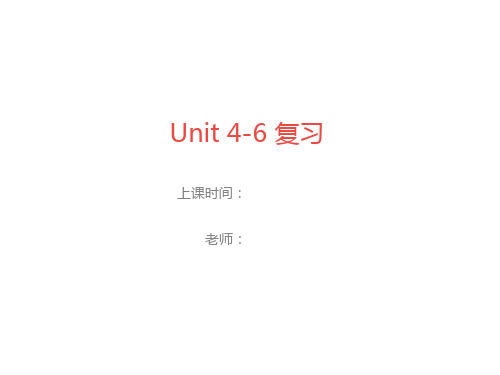
上课时间: 老师:
Unit 4 Don’t eat in class.
◆短语归纳
1.准时,按时 on time
2.听…… listen to …
3.在课上 in class
4.不得不 have to
5.上课/上班迟到 be/arrive late for class/work
12. 吵闹 be noisy
Unit 4 Don’t eat in class.
◆短语归纳 13.和某人打架 fight with sb. 14.留短发 keep one’s hair short 15.和某人一起玩 play with sb. 16.穿校服 wear a uniform 17.玩得高兴 have fun doing sth. 18.到北京/到学校 arrive in Beijing/at school 19.到家 arrive home 20.制订/遵守/违反规则 make/follow/break the rules
Unit 4 Don’t eat in class.
◆ 用法集萃
7. leave sth. sp.
把某物忘在某地
8. keep + 宾语+形容词
使……保持某种状态
9. learn to do sth.
学会做某事
10. remember to do sth.记得去做某事
remember doing sth. 记得做过某事
◆语法探究 Ⅱ.情态动词have to 和must 1.情态动词have to和must都表示“__________”的意思。have to 表示从__________条件上来看必须做某事;must表示说话人 __________必须要做某事。 如: There is no bus, you have to walk home. (没有公交车是客观 条件) 没有公共汽车,你必须走回家。 I must study English well. (想学好英语是一种主观想法) 我必须要学好英语。
人教新目标版初中英语七年级下册 unit6 period4 PPT课件
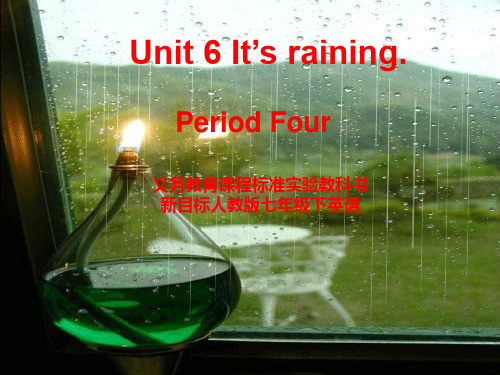
go shopping
fly kites
take photos
Where do you want to go? When do you want to go there? How’s the weather there? What do you want to do? Why?
name place
Unit 6 It’s raining.
Period Four
义务教育课程标准实验教科书 新目标人教版七年级下英语
spring
Warm,
summer
hot, humid
cool, dry
Winter
cold
Wenzhou
A: How is the weather in…? B: It’s…
blue Lily alwayswears _______ a _______
______________
unifoபைடு நூலகம்m .
Homework:
Summarize the key words and expressions in this unit.
cool! I am surprised they can play in this heat. This is a very interesting place. The people are really very relaxed!
It’s winter in France. The weather is __________ windy and _________. People are wearing __________ and scarves. But cold coats everyone is having a good time. Friends are _____________ eating park a musician is _________________ in restaurants. In a _____, playing the guitar are playing football One man is ___________ taking and some boys ________________. a _____________. photo
2014年人教版新目标英语七年级下册Unit6课件(79页)
2.结构:
be + doing
2. 动词-ing形式的构成 go going 一般在动词原 形后+ing ask asking 以不发音的e结 尾的, 去e, +ing 重读闭音节以 一个辅音字母 结尾的,双写 这一字母+ing write take close get run swim put writing taking closing getting running swimming putting
exercising
1a Match the activities with the pictures.
i 1. watching TV __ d 2. cleaning __ g 3. reading a newspaper __ a 4. talking on the phone __ h 5. listening to a CD __
No, I’m not.
特殊疑问句: 1. What are you doing? 2. What is he/she doing? 3. What are they doing?
2a. Listen and answer these questions.
1. What is Steve doing? He is watching TV. 2. What is Jack doing? He is listening to a CD.
2b. Listen again. Fill in the blanks.
2b Listen again. Fill in the blanks.
Jack: Hello, Steve. Steve: Hi, Jack. Jack: What _____ are you ______, doing Steve? Steve: I’m ___________. watching TV What about you? Jack: I’m _______________, listening to a CD but it’s kind of _______. boring Steve: Yeah, my TV show is also not very __________. interesting Do you want to _____ go to the movies? Jack: That sounds good.
七年级英语下册Unit4~Unit6 复习课件
三、核心句子
ቤተ መጻሕፍቲ ባይዱ
重点句型
1.It_i_s_t_h_e__d_u_t_y_o_f_d_o__c_to_r_s_t_o__s_a_v_e_t_h_e__lives of patients
拯救病人的生命是医生的职责
2.It’s best not __n_o_t_t_o__ru_n__a_w__a_y_f_ro__m___ our problems
语法突破
C.祈使句+ and(or)+ 陈述句 和if 条件状语从句的转换。 1)早点起床,否则你会迟到。 Get up early, ___ you’ll be late. = ___ you ___ get up early , you’ll be late. 2)努力学习你就会通过考试。 Study hard and you ___ pass the exam. =____you study hard, you ___ pass the exam.
重点短语
1.__c_u_t _u_p____切碎, _c_u_t_o_f_f ____切断;中断;使死亡;剥夺继承权 _c_u_t_d_o_w_n___v. 削减;砍倒;杀死 _c_u_t_o_u_t____ 切断;删去;停止;关掉
人教版七年级下Unit4-6复习ppt课件(59页)
词原形前面加__D__o_n_’_t___ 。如: Be quiet in the classroom, please. 在教室里请保持安静。 Don't fight. 不要打架。
2. Watching TV __t_o_o__m__u_c__h____is bad for our health. Ⅲ.用 too, also 或 either 填空
1. He speaks English. He can __a_l_s_o___ speak Chinese. 2. I like Mount Tai. He likes it, ___to__o___. 3. She isn't late. I am not late, _e_i_t_h_e_r__.
—It's very useful. People use it to cross the rive
to the town.
A.from
B.Into
C.on
D.of
英语·新课标(RJ)
Unit 5 ┃ 易错点针对训练
Ⅱ.用所给词的适当形式填空 1. —Don't forget it. —Don't worry. I still remember__to__s_e_n_d_(send)an email for you tonight. 2. I still remember my grandpa _te__a_c_h_in_g_(teach) me to play cards.
英语(新目标)
七年级下册
Unit 6 单元复习课件-七年级英语下册同步备课系列(人教新目标Go for it!)
My parents aren’t at home. We can eat out. Laura: Yeah. I’d love to. Jenny: Let’s meet at my home first. Come at half past six. Laura: OK. See you then.
Words
10. 儿童 n. _c_h_il_d_____ 11. 可口的,美味的 adj. _d_e_l_ic_i_o_u_s 12. 房子 n. __h_o_u_s_e____ 13.希望 v. __w__is_h__ 14.出去吃 __e_a_t_o_u_t__ 15.男人,人 n. ___m_a_n____ 16.一个...另一个...__o_n__e._.._t_h_e_o_t_h_er... 17.一些...另一些..._s_o_m__e_.._.o_t_h_e_r_s_.._. 18.美国__A_m__e_r_ic_a
He isn’t reading the newspaper. 他没在看报纸。
Be (Am, Is, Are) + 主语 + v-
ing + 其他?
一般 疑问句
肯定回答:Yes, + 主语 + be.
否定回答:No, + 主语 + be
+ not.
—Are they playing soccer? 他们在踢足球吗? —Yes, they are./ No, they aren’t. 是的,他们在踢。/不,他们没在踢。
- 1、下载文档前请自行甄别文档内容的完整性,平台不提供额外的编辑、内容补充、找答案等附加服务。
- 2、"仅部分预览"的文档,不可在线预览部分如存在完整性等问题,可反馈申请退款(可完整预览的文档不适用该条件!)。
- 3、如文档侵犯您的权益,请联系客服反馈,我们会尽快为您处理(人工客服工作时间:9:00-18:30)。
Fill in the blanks:
1. I work with ____ people and money. People ____ to me and give their money ___ ___ ____ me. get their money from 2. I wear ___ a uniform and I ____ _________ I work ___ help doctors. Sometimes in the day and sometimes at ___ night.
一、根据句意完成单词
eporter from CCTV. 1、Wang Xiaoya is a r_______ niforms at school. 2、Young students often wear u_______ ospital 3、If you are ill, you must go to the h________. alk The teacher is coming. 4、Don’t t____! agazines after work. 5、Jim’s father likes to read m________ 6、My grandma often tells me interesting s________. tories 7、Do you want a busy but e_______ xciting job? hieves don’t like the police. 8、T______ 9、My daughter is only 4 years old. She is so y______ oung that she can’t go to school. angerous 10、Being a policeman is kind of d________.
1.---Where ___your cousin work?---At a hotel.
A. is B. are C. has D. does
2.I am a policeman ,so ____don’t like me . A. People B. children C. thieves D. workers
3.
My work is interesting but ___ kind of _________. Thieves ______ don’t like me. dangerous 4. I like talking ______ to people. I _____ meet interesting people every day and ask themquestions ________. 5. I work ____. ____ when late I’m very busy dinners people go out to ________.
8.Mr Bill is ill in __ hospital. He can’t be here today. A. the B. a C. an D. /
9.My job is always giving people their money or getting money from them .It’s not ___at all.
15.in the day (在白天) 16.thief (单) thieves (复) 17.hard = difficult (困难) easy (简单) 18.be in (参加;在家) 19.school play (校园剧) 20.young (年轻的) old (老的) 21.put on (穿上) <动作> wear (穿着) <状态> 22.listen to…. (听……) <对象> hear (听见) <结果> 23.look at….(看……) <对象> see (看见) <结果>
SUMMER JOB:
Do you like to talk with people? Do you like to write stories? Do you want to work for a magazine? Then come and work for us as a reporter ________________. Please call Karen at 555-8823 As a reporter, what do you like to do? I like to talk with people and write stories.
HELP WANTED:
Do you like to sing and dance? Do you like to work with other young people? Do you want to be in the school play? Do you like to work evenings and weekends? We need
WANTED:
Do you like to work late? Do you like to work hard? Do you like to meet people? If your answer is “Yes”, then we have a job for you as a waiter ________________. Call Alan’s Restaurant at 555-3937. As a waiter, what do you like to do? I like to work late, work hard and meet people.
actor an ____________ 555-2559. As an actor, what do you like to do? I like to sing and dance, work with other people.
和…一起工作 work with 重点词语 give sb sth/ give sth to sb 给某人某物 get sth from sb 从…取走… wear the uniform 穿着制服 帮助某人干某事help sb do sth/ help sb with sth kind of dangerous 有点危险 talk to sb / talk with sb 与某人交谈 talk about sth 谈论某事 interesting people 有趣的人 let sb do/ ask sb to do 让某人干… 工作(到很)晚 work late be busy doing sth/be busy with sth 忙于干某事 外出就(晚)餐 go out to dinners
2016年春人教新目标版七年级下册
Unit 4—6单元期末总复习
陆集中学: 余代新
Unit 4 I want to be an actor
1.want to be a/an….(想要当…..) 2.shop assistant (店员) 3.a.What + do/does + sb. +do? b. What + be +sb.? c. What’s + one’s +job ? (某人是干什么工作的?) 4.give sth. to sb. = give sb. sth. (把某物给某人) station (电视台) 6.police station (派出所) 7.in a hospital (在医院里) 8.in hospital (住院) 9.go out (出去) 10.go back (回去) e out (出来) e back (回来)
A. interesting B. boring C. easy D. safe
10.I ask them to give ma a hamburger ___ meat in it . A. Have B. with C on D. has
Unit 5 I’m watching TV
• 1.现在进行时: a.现在正在发生或进行的动作. • b.构成: 主语 + be动词 + 动词的现在分词 <两者 缺一不可> • c.动词现在分词的构成: • <1>一般直接在词尾加“ing”; • <2>以不发音“e”结尾的,去 “e”加 “ing”; • <3>双写最后一个字母,再加 “ing”; eg: begin, get, let, sit, put, run, drop, hit, forget, swim, stop, travel, plan, shop; • d.现在进行时的标志词:look, listen, now, It’s + 时刻
school
bank restaurant shop TV station police station
What do you do ? I am a /an …. Where do you work? I work in ...
What do you want to be ? I want to be a ...
工作到很晚
努力工作
work late work hard
meet people talk with people write stories
与人交往
与人交谈
写故事
为杂志社工作 work for a magazine 与其他年轻人一起工作 work with other young people 对---感兴趣 be interested in sth
nurse
A: B: A: B:
A: What do you do? aam student B: I a/an .… A: What do you want to be? B: I want to a be teacher a/an… .
